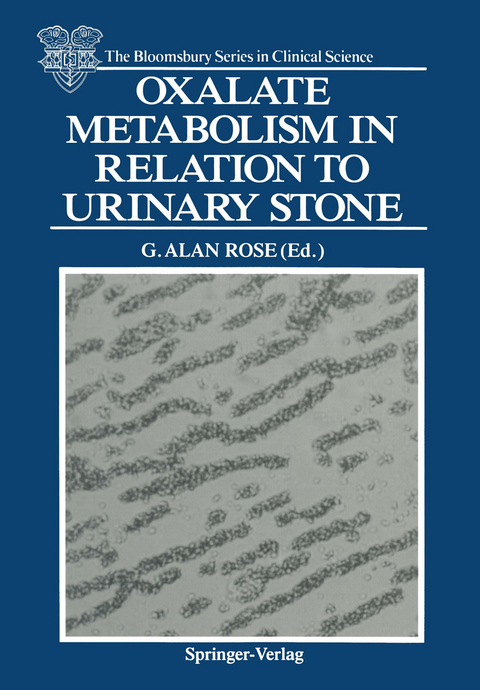
Oxalate Metabolism in Relation to Urinary Stone
Springer London Ltd (Verlag)
9781447116288 (ISBN)
"Oxalate Metabolism in Relation to Urinary Stone" is the third monograph to appear in the "Bloomsbury Series". Edited by Alan Rose, the book describes the current clinical and biochemical features of oxalate metabolism. Its content and direction fulfil the goals of the Series emphasising the strong links between basic science and clinical medicine. London Jack Tinker 30 March 1988 Preface The first oxalate workshop was held in London in 1979 and the proceedings published privately by the Wellcome Foundation. At that time the importance of urinary oxalate as a risk factor more important for calcium oxalate stone formation than urinary calcium had been recognized. Nevertheless measurements of urinary oxalate still left a lot to be desired and in particular the non-enzymatic conversion of ascorbate to oxalate had not been rediscovered so that many measurements must have been wrong. Plasma oxalate was still difficult or impossible to measure by any reasonable, accessible methods and consequently there was still much argument and speculation about the handling of oxalate by the kidneys. A lot of work has been performed in the last eight years on oxalate metabolism and it therefore seemed to the organisers to be a good time to hold a second oxalate workshop.
1 Introduction.- Plasma Oxalate/Creatinine Ratio.- Renal Hyperoxaluria?.- 2 Assay of Oxalate and Glycollate in Urine.- Relevant Chemistry of Oxalate and Glycollate Anions.- Assaying of Oxalate in Urine.- Assaying for Urinary Glycollate.- Usefulness of Urinary Glycollate in Determining the Origin of Hyperoxaluria.- Summary.- 3 Experiences with an External Quality Assessment Scheme for Urinary Oxalate.- Urinary Oxalate Assay — the Need for External Quahty Assessment.- Organisation of the Quality Assessment Scheme.- Results.- Discussion.- Conclusion.- 4 Assaying of Oxalate in Plasma.- Plasma-Oxalate Determination.- Assaying of Plasma Oxalate at St Peter’s Hospitals (London).- Plasma Oxalate Levels in Normal and some Pathological States. Clinical Usefulness of Plasma Oxalate.- Circadian Variation of Plasma Oxalate. Implications for zxOxalate Clearance.- Conclusions and Summary.- 5 Primary Hyperoxaluria.- Clinical Aspects.- Biochemistry.- Investigation and Evaluation of Patients with Primary Hyperoxaluria.- Treatment.- 6 Primary Hyperoxaluria in Children.- Clinical Features.- Biochemical Features.- Progress.- Treatment.- The Future.- 7 Enteric and Other Secondary Hyperoxalurias.- Oxalate Metabolism and Secondary Hyperoxaluria.- Pathogenesis of Enteric Hyperoxaluria.- Clinical Importance of Enteric Hyperoxaluria.- Treatment of Enteric Hyperoxaluria.- Summary.- 8 Mild Metabolic Hyperoxaluria. A New Syndrome.- Historical.- Clinical Details of Patients.- Link with Other Conditions.- Response to Pyridoxine.- Aetiology.- Have Others Seen MMH?.- Effect of Pyridoxine on Stone Formation.- 9 Oxalate Crystalluria.- Crystal Types Seen by Light Microscopy at 37°C.- Investigating Crystalluria.- Inducing Crystallisation.- Generating Crystals by Evaporation.- Quantitative CrystalMeasurements.- Chemical Analysis of Urinary Crystals.- Recent Studies of Crystalluria.- Crystal Sizes.- “Eroded” Envelope Oxalate Crystals.- The Importance of Urinary Oxalate in Calcium Oxalate Crystalluria.- Microscopy of Urinary Oxalate Crystals.- Aggregation of Envelope Oxalate Crystals.- Role of Urinary Calcium Concentration in Oxalate Crystalluria.- Urine Osmolality and Calcium Oxalate Crystalluria.- Osmolality and Calcium Phosphate Crystalluria.- pH Effects on Crystalluria.- Inhibitors of Calcium Oxalate Crystallisation.- Summary.- 10 Renal Failure and Transplantation in Primary Hyperoxaluria.- Clinical Aspects.- Systemic Oxalosis.- Peritoneal Dialysis and Haemodialysis.- Renal Transplantation.- Combined Hepatic and Renal Transplantation.- Conclusion.- 11 Vitamin B6 Metabolism in Relation to Metabolic Hyperoxaluria.- Methods for Studying Pyridoxine Metabolism.- Evaluation of Plasma Vitamin B6 Methods.- Physiology of Pyridoxine.
| Reihe/Serie | The Bloomsbury Series in Clinical Science |
|---|---|
| Zusatzinfo | XVI, 197 p. |
| Verlagsort | England |
| Sprache | englisch |
| Maße | 170 x 244 mm |
| Themenwelt | Medizinische Fachgebiete ► Innere Medizin ► Nephrologie |
| Medizin / Pharmazie ► Medizinische Fachgebiete ► Urologie | |
| Medizin / Pharmazie ► Pflege | |
| Naturwissenschaften ► Biologie ► Biochemie | |
| ISBN-13 | 9781447116288 / 9781447116288 |
| Zustand | Neuware |
| Informationen gemäß Produktsicherheitsverordnung (GPSR) | |
| Haben Sie eine Frage zum Produkt? |
aus dem Bereich


